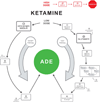Ketamine as a promising prototype for a new generation of rapid-acting antidepressants
- PMID: 25727103
- PMCID: PMC4412785
- DOI: 10.1111/nyas.12718
Ketamine as a promising prototype for a new generation of rapid-acting antidepressants
Abstract
The discovery of ketamine's rapid and robust antidepressant effects opened a window into a new generation of antidepressants. Multiple controlled trials and open-label studies have demonstrated these effects across a variety of patient populations known to often achieve little to no response from traditional antidepressants. Ketamine has been generally well tolerated across patient groups, with transient mild-to-moderate adverse effects during infusion. However, the optimal dosing and route of administration and the safety of chronic treatment are not fully known. This review summarizes the clinical effects of ketamine and its neurobiological underpinnings and mechanisms of action, which may provide insight into the neurobiology of depression, relevant biomarkers, and treatment _targets. Moreover, we offer suggestions for future research that may continue to advance the field forward and ultimately improve the psychopharmacologic interventions available for those individuals struggling with depressive and trauma-related disorders.
Keywords: antidepressant; depression; ketamine; neurobiology; treatment mechanisms.
Published 2015. This article is U.S. Government work and is in the public domain in the USA.
Conflict of interest statement
Dr. Averill declares no conflicts of interest.
Figures


Similar articles
-
Ketamine and rapid-acting antidepressants: a window into a new neurobiology for mood disorder therapeutics.Annu Rev Med. 2015;66:509-23. doi: 10.1146/annurev-med-053013-062946. Epub 2014 Oct 17. Annu Rev Med. 2015. PMID: 25341010 Free PMC article. Review.
-
What is the mechanism of Ketamine's rapid-onset antidepressant effect? A concise overview of the surprisingly large number of possibilities.J Clin Pharm Ther. 2017 Apr;42(2):147-154. doi: 10.1111/jcpt.12497. Epub 2017 Jan 22. J Clin Pharm Ther. 2017. PMID: 28111761 Review.
-
Ketamine: A Paradigm Shift for Depression Research and Treatment.Neuron. 2019 Mar 6;101(5):774-778. doi: 10.1016/j.neuron.2019.02.005. Neuron. 2019. PMID: 30844397 Free PMC article. Review.
-
[Ketamine--a new treatment option for therapy-resistant depression].Fortschr Neurol Psychiatr. 2015 Feb;83(2):91-7. doi: 10.1055/s-0034-1398967. Epub 2015 Feb 27. Fortschr Neurol Psychiatr. 2015. PMID: 25723773 Review. German.
-
[Ketamine for treatment of acute depression].Ugeskr Laeger. 2013 Sep 9;175(37):2090-3. Ugeskr Laeger. 2013. PMID: 24011203 Review. Danish.
Cited by
-
Ketamine-Associated Brain Changes: A Review of the Neuroimaging Literature.Harv Rev Psychiatry. 2018 Nov/Dec;26(6):320-339. doi: 10.1097/HRP.0000000000000179. Harv Rev Psychiatry. 2018. PMID: 29465479 Free PMC article. Review.
-
Comparative Transcriptomic Analysis of the Effects of Antidepressant Drugs in Stress-Susceptible Mice.Biol Psychiatry. 2017 Feb 15;81(4):278-279. doi: 10.1016/j.biopsych.2016.10.022. Biol Psychiatry. 2017. PMID: 28089023 Free PMC article. No abstract available.
-
The intersection of astrocytes and the endocannabinoid system in the lateral habenula: on the fast-track to novel rapid-acting antidepressants.Mol Psychiatry. 2022 Aug;27(8):3138-3149. doi: 10.1038/s41380-022-01598-4. Epub 2022 May 18. Mol Psychiatry. 2022. PMID: 35585261 Review.
-
Convergence, preliminary findings and future directions across the four human connectome projects investigating mood and anxiety disorders.Neuroimage. 2021 Dec 15;245:118694. doi: 10.1016/j.neuroimage.2021.118694. Epub 2021 Oct 31. Neuroimage. 2021. PMID: 34732328 Free PMC article.
-
Inducible Nitric Oxide Inhibitors Block NMDA Antagonist-Stimulated Motoric Behaviors and Medial Prefrontal Cortical Glutamate Efflux.Front Pharmacol. 2015 Dec 15;6:292. doi: 10.3389/fphar.2015.00292. eCollection 2015. Front Pharmacol. 2015. PMID: 26696891 Free PMC article.
References
-
- Kessler RC, et al. The epidemiology of major depressive disorder: results from the National Comorbidity Survey Replication (NCS-R) JAMA : the journal of the American Medical Association. 2003;289:3095–3105. - PubMed
-
- Rush AJ, et al. Acute and longer-term outcomes in depressed outpatients requiring one or several treatment steps: a STAR*D report. The American journal of psychiatry. 2006;163:1905–1917. - PubMed
-
- Katz MM, et al. Onset and early behavioral effects of pharmacologically different antidepressants and placebo in depression. Neuropsychopharmacology : official publication of the American College of Neuropsychopharmacology. 2004;29:566–579. - PubMed
-
- Gaynes BN, et al. What did STAR*D teach us? Results from a large-scale, practical, clinical trial for patients with depression. Psychiatric services (Washington, D.C.) 2009;60:1439–1445. - PubMed
Publication types
MeSH terms
Substances
Grants and funding
LinkOut - more resources
Full Text Sources
Other Literature Sources
Medical

